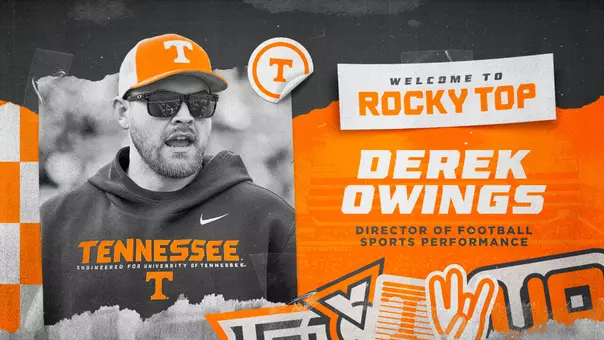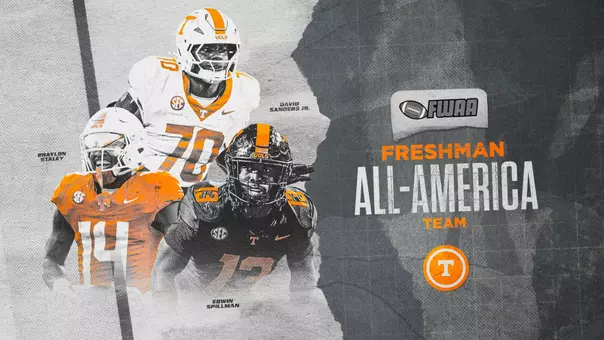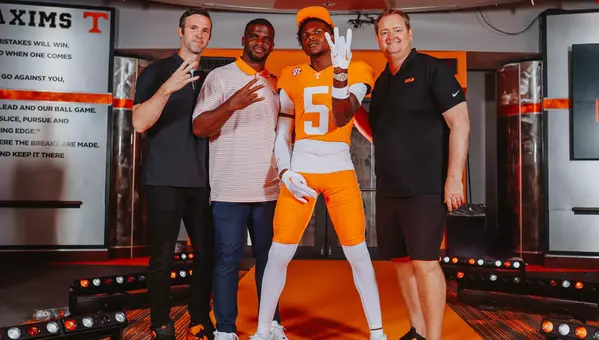University of Tennessee Athletics
2002 Football Captains Selected
August 22, 2002 | Football
| 2002 Captains |
 |
| Eddie Moore |
 |
| Omari Hand |
 |
| Will Offenheusle |
Linebacker Eddie Moore, defensive end Omari Hand and offensive tackle Will Ofenheusle have joined an elite Tennessee football fraternity, by being elected captains of the 2002 Volunteers football team. It was late in the evening of August 20, shortly after completion of a nocturnal scrimmage at Neyland Stadium, when Condredge Holloway called to say that head coach Phillip Fulmer was meeting with the team to let them know the results of voting on the 2002 captains.
"I'm really pleased with the team's selections," Fulmer said. "I don't think they could have selected three better than those guys. I'm looking forward to their leadership along with the rest of the seniors."
Here's a look at the leaders of the 2002 Vols.
Moore, senior linebacker from South Pittsburg down in Marion County just west of Chattanooga, led the 2001 team with 81 total tackles. He has played in 37 of 37 games in his career, starting all 13 for the Vols in 2001. He had eight tackles, a sack and a tackle for loss in the Vols' 28-18 win at Notre Dame and had seven tackles in the 17-10 win over South Carolina.
"It's a real honor to be named a captain," Moore said. "It shows that our teammates and coaches look up to us to be a leader.
"We were named the captains, but we have a lot of leaders on this team. This doesn't change my role at all. It only expands it."
Hand, from Tallahassee, Fla., is one of six seniors expected to see action on the defensive front. He had posted 21 tackles and three tackles for loss in 2001. He started twice at left defensive end and is tabbed to start there in 2002. He has been a part of the defensive end rotation for three years and 2002 appears to be his breakout season.
"I felt good that my teammates see me as a captain," Hand said. "The seniors have already been trying to get everybody to work hard. There's nothing on our shoulders that we haven't already been doing."
Ofenheusle, from Martin, joins Anthony Herrera as seniors on the offensive front and has quietly become a team leader since starting all 13 games last season. With NFL-caliber size and strength, he looks to shine on a national scale this season. He is a key component in maintaining the Vols' status as a dominant offensive line. No. 73 is a load up front.
"It's a great honor because it's something everyone works so hard for," Ofenheusle said. "To be elected to represent the whole team is awesome, especially since I'm from Tennessee.
"Chad Clifton and I played on the same junior high team, the same high school team and now at Tennessee and we were each a captain. Whenever I first came here from Martin in 1998, I was trying to make the team. Being a captain was a goal that seemed almost unattainable."
Moore is the third Vols captain from Marion County, joining Eddie Brown (Guild 1973) and Eric Westmoreland (Jasper 2000). Hand is the first to come from Tallahassee and Ofenheusle is the second from Martin, joining Chad Clifton (1999).
Fulmer's announcement sent the memory banks into overdrive. It brought to mind the young men, 149 in all, who have now been captains at Tennessee, dating all the way back to H.K. Denlinger in 1891 and all points in between then and now.
Here's a look at the captains over the years and what they all have to offer in the pages of Vols history.
Captains lead by example. At least that's what 1968 captain Dick Williams said about Hal Wantland, captain of the 1965 team, the year Dick was a freshman.
"When I got to UT as a freshman in 1965," Williams said, "the captains were responsible for making sure the players were doing what they were supposed to.
"Alternate captains Neal McMeans and Richard Pickens and I tried to model ourselves after what Hal Wantland, Frank Emanuel and Bobby Gratz had done in 1965. We had all been impressed with their leadership and the way they provided the limits and boundaries as to what the players could do. Hal was a really good captain."
Four captains - Nathan Dougherty (1909), Bowden Wyatt (1938), Bob Johnson (1967) and Reggie White (1983) - have been elected to the College Football Hall of Fame.
Dougherty was one of Tennessee's earliest captains and had an outstanding career at Tennessee. He hired Capt. Neyland as head coach and the Engineering Building on the Hill is named in his honor. Johnson was a much-decorated Vols in the Peyton Manning mold (or was Peyton a much-decorated Vols in the Bob Johnson mold? You figure it out.).
Wyatt, you will remember, was elected to the Collegiate Hall as a player at Tennessee and for his coaching career at Wyoming, Arkansas and Tennessee, where he won conference titles in three different leagues, Skyline, Southwest and Southeastern.
Roscoe Word was captain of three teams, 1904, 1905, and 1907, while J.G. Lowe was captain of two, 1924 and 1925.
Charles Moore (1892) is the man responsible for the Orange and White colors for UT. The Orange hue coming from the American Daisy, which grew in profusion on "The Hill" at the north end of Shields-Watkins Field/Neyland Stadium. Colors were later voted on by the student body, but Moore is the one credited with the idea. The Orange shirts were first used in the 1922 season, when Roy Striegel was captain.
Two captains became head coach at Tennessee. John Barnhill (1927) was head coach from 1941-45, compiling a record of 32-5-2. The other was Bowden Wyatt (1938), a two-time Hall of Fame selection who led the Vols from 1955-62. Two alternate captains also became head coach at Tennessee, Johnny Majors (1956) and Phillip Fulmer (1971).
There were two multi-name captains, known by all three of their monikers. They were Joe Black Hayes (1937) and Lemont Holt Jeffers (1981).
Captains also dotted All-America lists during their time on "The Hill." Here's a look.
Bowden Wyatt, Bill Johnson (1957), Darris McCord (1954), Steve DeLong (1964), Paul Naumoff (1966), Austin Denney (1966), Bob Johnson, Jackie Walker (1971), Jamie Rotella (1972), Eddie Brown (1973), Roland James (1979), Reggie White, Tim McGee (1985), Chris White (1985), Harry Galbreath (1987), Keith DeLong (1988), Eric Still (1989), Leonard Little (1997), Peyton Manning (1997), Al Wilson (1998) and John Henderson (2001) were captains who earned All-America honors.
A pair of co-captain tandems earned All-America honors, Denney and Naumoff in 1966, and Manning and Little in 1997 were co-captains who made All-America the same year they were captains.
Then there were the nicknames, the other nom de plumes that, for whatever reasons, stuck with each player throughout his life for better or for worse. Consider the following: Roscoe "Piggy" Word, Nathan "Big-un" Daugherty, C.H. "Slick" Fonde (1912), "Farmer" Kelly (1914), W.O. "Chink" Lowe (1919), Adolphus "Buck" Hatcher (1920), Roy "Pap" Striegel (1922), Robert "Tarzan" Holt (1923), Harry "Hobo" Thayer (1930), Eugene "Skeets" Mayer (1931), Talmadge "Sheriff" Maples (1933), Jim "Young-un" Haslam (1952), John "Pappa John" Gordy (1956), Condredge "The Artful Dodger" Holloway (1974), Danny "Pert" Jenkins (1977), Jimmy "Bird Legs" Streater (1979), Mike L. "Stop" Cofer (1981), Reggie "The Minister of Defense" White, Stephen "Bubba" Miller (1995), Tamaurice "Tee" Martin (1999) and Eric "Emo" Westmoreland.
Captains have received votes in the Heisman balloting: Steve DeLong, Bob Johnson, Condredge Holloway, Larry Seivers (1976) and Peyton Manning, the latter three different times.
"It was an honor to be named captain because your teammates voted you so," Condredge Holloway, a co-captain of the 1974 team with Jim Watts, said.
The captain from the longest distance away was Craig Puki (1979), from Seattle, Wash.
The best, most prosaic, captain hometown was North Tonawanda, N.Y., home of Jim Beutel (1955) and Bobby Urbano (1958).
Beutel was involved in one of the most memorable moments in Vols history when Bowden Wyatt came home in 1955. Beutel was captain of the 1955 team, Wyatt's first team. At the banquet honoring the 1954 team, Wyatt presented Jim a coin he had won in a coin toss before a game 17 years earlier, saying he had kept it and planned to give it to his first captain at Tennessee. It was a magic moment.
Then there are the cities from which more than one captain came from. To wit:
Bristol: Hal Littleford (1949) and Greg Jones (1977).
Chattanooga: Skeets Mayer (1931), Nate Middlebrooks (1988), Reggie White.
Cleveland, Tenn.: Ralph Chancey (1949), Bob Johnson, Chris White (1985), Dale Jones (1986).
Franklin: Darris McCord (1954), Bubba Miller (1995).
Jackson: Sam Hayley (1913), Ralph Hatley (1934), Al Wilson (1998).
Kingston: Bowden Wyatt, Kevin Mays (1994).
Knoxville: W. M. Newman (1900), E.A. McLean (1915), Chink Lowe (1919), Sheriff Maples (1933), Ray Graves (1941), Bill Young (1969), Jackie Walker (1971), Mike L. Cofer (1982), Joey Clinkscales (1986), J.J. McCleskey (1992).
Nashville: John Gordy (1956), Austin Denney (1966), Cory Fleming (1993), Will Bartholomew (2001).
Cincinnati: Al Hust (1942), Jack Stroud (1950), Joe Schaffer (1959), Tim McGee (1985).
Charleston, W. Va.: Harry Thayer (1930), Ron McCartney (1975).
If you want to be a Tennessee captain, Hampton, Va., is the place to be from. Three Vols from Hampton have lettered -- Lemont Holt Jeffers (1981), Todd Kelly (1992), James Wilson (1993) - and all three have been captains.
There is one father-and-son combination that may outstrip all the others. Not only were Steve DeLong and son, Keith DeLong (1988), captains, they were also All-America selections and No. 1 draft choices. One other note: Steve's brother, Ken, was an alternate captain of the 1969 SEC Championship team.
Steve DeLong and John Henderson each won the Outland Trophy, symbolic of the nation's best interior lineman, Steve in 1964, John in 2000.
There was also a grandfather and grandson combination, notably Sam Bartholomew (1939) and grandson Will Bartholomew (2001). Sam's son, Sam, Jr., was a captain at Army in 1965.
The captain who never was a captain:
"O.C. Lloyd, elected in January to serve as captain of the 1943 Vols, wasn't especially disappointed when he received news in March 1943 the season had been cancelled because of World War II," Haywood Harris wrote in a history of Shields-Watkins Field in 1996. "Lloyd was too busy packing his duffel bag as a new recruit in the Army to worry about anything as trivial as football."
"Most of us who played in 1942 got drafted before the 1943 season started," said Lloyd, an end from West Virginia who returned after World War II and had a successful career as a coach and high school administrator in Knoxville. UT decided there wouldn't be enough boys around that fall to field a team."
Lloyd, who lettered in 1941 and 1942, never played football again. A shrapnel wound to his right knee sustained in Europe ended his days on the gridiron. He was born in 1921, the same year Shields-Watkins Field was opened.
Captains were also good blockers. Sam Bartholomew, Billy Bevis (1945), Hal Wantland (1965), Bob Johnson (1967), Harry Galbreath (1987) and Eric Still (1989) each won the Jacobs Trophy as the SEC's best blocker, with blocking backs Bartholomew (1938 and 1939) and Bevis (1944 and 1945) won the award twice.
Four captains were named Academic All-America: Bill Johnson, Bob Johnson, Tim Priest, and Peyton Manning.
The most captains were six in 1999 (Chad Clifton, Dwayne Goodrich, Tee Martin, Billy Ratliff, Spencer Riley and Darwin Walker).
The first co-captains were Ralph Chancey and Hal Littleford in 1946. Since then, there have been have been 13 co-captains and 12 sets of multi-captains.
Here's a note. There were co-captains in the same year from the same hometown. The year was 1991, when Earnest Fields and John Fisher (1991) led the Vols. Both of them were from Milan.
There was a walk-on who became a captain, in a Horatio Alger story of sorts. He was Knoxville's J.J. McCleskey (1992).
Record holders: 1970 captain Tim Priest is still the school record holder for career interceptions (18 from 1968-70).
Two captains hold or held NFL records. Bert Rechichar (1951) held the NFL record for the longest field goal (56 yards) until New Orleans' Tom Dempsey broke it with a 63-yarder in 1970. Reggie White is the NFL sack leader with 198 during his career. He also holds the UT career sack record (32), the season sack record (15) and game sack record (4). Peyton Manning is the all-time total offense and passing yardage king at Tennessee.
That's a look at the captains for 2002 and the captains over the long and glorious history of Tennessee football. We don't know with mathematical certainty how the new captains will perform in their duties, but we do know they are a good bunch.
We do know how well captains throughout the years have done. This has been their story.
















